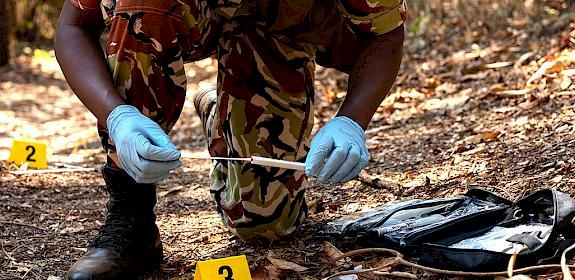World Leaders mobilise resources to combat biodiversity crisis and Build Back Better
Kunming, China – Governments adopted a high-level declaration to reverse biodiversity loss by 2030 and provide the political momentum needed to meet the targets of the Post-2020 Global Biodiversity Framework. TRAFFIC is encouraged by the commitments made at the UN Biodiversity Conference 2020 in Kunming, China, but stressed that much more work needs to be done to translate these commitments into bold and transformative action on the ground.
At the opening of the first part of the 15th meeting of the Conference of the Parties to the Convention on Biological Diversity (CoP15), Chinese President Xi Jinping announced the launch of a 1.5 billion yuan (USD 232.47 million) Kunming Biodiversity Fund. This week the European Union also committed to doubling its external funding for biodiversity, and Japan pledged an additional 1.8 billion yen (USD 16 million) towards its own Japan Biodiversity Fund.
"The most tangible demonstration of the political commitment shown by countries this week has been the pledges made by countries to mobilise the financial resources needed to reverse the devastating rate of biodiversity loss," said TRAFFIC Executive Director Richard Scobey.
"Many countries have expressed the need to build the capacity needed for them to successfully implement such ambitious targets. We hope that clear, transparent, and structured mechanisms are established that will allow quick access to these resources where it is most needed."
For the first time, the draft Post-2020 Global Biodiversity Framework features a target that directly addresses the harvest, use and trade of wild species of flora and fauna and targets that recognise the benefits to conservation and humans resulting from the legal and sustainable use of wild species.
At the Conference, many countries also stressed the need for a balanced approach in terms of the implementation of the three goals of the Convention: the conservation of biological diversity; the sustainable use of the components of biological diversity; and the fair and equitable sharing of the benefits arising out of the utilisation of genetic resources.
"In this regard, TRAFFIC welcomes the greater emphasis the draft Post-2020 Global Biodiversity Framework now gives to sustainable use of biodiversity and is encouraged by many countries at the Conference highlighting the important role it can play to 'build back better,'" Scobey said.
Another central theme highlighted throughout was the inter-connectedness of biodiversity loss and climate change, with the urgent need to address the biodiversity and climate crises in a more integrated manner. Governments also called for synergistic approaches for transformative cross-sector collaboration to combine climate change resourcing, financing, and finding nature-based solutions to these challenges.
"Climate change presents the most existential threat to both people and nature today," Scobey said.
"Given our intimate knowledge of how the global supply chains of natural resources work and the best ways to promote the sustainable use and management of those resources, TRAFFIC is keen to support governments develop nature-based solutions - harnessing the power of nature to reduce greenhouse gas emissions and also help communities adapt to the impacts of climate change."
While parties have made strong commitments and established consensus on the bold and transformative actions needed, Scobey reminded governments of the international community's collective failure to successfully implement the targets set in the Convention's previous ten-year strategy. In May 2019, a landmark report from the United Nations' Intergovernmental Science-Policy Platform on Biodiversity and Ecosystem Services (IPBES) suggested that none of the
20 Aichi Biodiversity Targets were fully met by the target date of 2020.
"We must not fail again," Scobey said. "An effective monitoring mechanism and robust indicators are absolutely essential if the Post-2020 Framework is to be implemented effectively and will prompt the transformative changes needed to reverse the rapid decline in nature. TRAFFIC stands ready to assist Parties with the relevant research and information needed to develop and measure progress on these indicators.”
The UN Biodiversity Conference 2020, attended by nine Heads of State and Ministers and senior officials from 97 countries, ends this Friday, 15 October 2021. Negotiations on the Post-2020 Global Biodiversity Framework will continue and are expected to be agreed upon and adopted by governments at the second part of the 15th meeting of the Conference of the Parties to the CBD (CoP15) in Kunming from 25 April to 8 May 2022.
Notes:
- The Kunming Declaration adopted this week will be submitted to the General Assembly of United Nations, the 2022 High-Level Political Forum on Sustainable Development, and the second part of the 5th United Nations Environment Assembly.
- TRAFFIC calls for robust targets and indicators in the Post-2020 Global Biodiversity Framework
About the Convention on Biological Diversity

The Convention on Biological Diversity (CBD) is an international treaty for the conservation of biodiversity, the sustainable use of the components of biodiversity and the equitable sharing of the benefits derived from the use of genetic resources.
The Convention seeks to address all threats to biodiversity and ecosystem services, including threats from climate change, through scientific assessments, the development of tools, incentives and processes, the transfer of technologies and good practices and the full and active involvement of relevant stakeholders including indigenous and local communities, youth, non-governmental organizations, women and the business community.
The Cartagena Protocol on Biosafety is a subsidiary agreement to the Convention seeking to protect biological diversity from the potential risks posed by living modified organisms resulting from modern biotechnology. To date, 160 countries plus the European Union have ratified the Cartagena Protocol. The Secretariat of the Convention and its Cartagena Protocol is located in Montreal. For more information visit www.cbd.int





